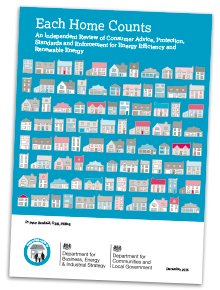Bonfield Review
On 16 December 2016, the long-awaited Bonfield Review, ‘Each Home Counts’ was published.
Originally launched in 2015 by the then-Department of Energy and Climate Change (DECC) in the wake of the failure of the Green Deal, the report has been criticised for numerous delays. The purpose of the review was to examine, and make recommendations, about how consumers can be protected and advised when installing energy efficiency and renewable energy measures in their homes.
There are 27 recommendations included in the review, including:
- There should be a single quality mark for all energy efficiency and renewable energy measures.
- The development of an information hub and data warehouse allowing consumers to access better data relating to their homes, leading to better advice.
- New approaches to engaging with consumers about renewables and energy efficiency through awareness raising at local and national levels.
- Embedding core knowledge into the industry, including building physics, and design stage and consumer interaction connected with the assessment of competence of businesses.
- A robust and joined-up industry-wide compliance and enforcement regime coordinated nationally to include on site monitoring or audits.
In response to the review, Sustainable Homes said:
‘The Quality Mark is a good thing for the industry, but it must have weight. If properly backed by enforcement then it will work. If it leads to quality as in the form of the best Passivhaus schemes then it will work. If it simply becomes a badge for installers to win more work then the Bonfield Review will have been for nothing.’
Brian Berry, Chief Executive of the Federation of Master Builders (FMB), said:
‘The energy efficiency and renewable energy sectors, like the wider domestic building industry, remain largely under-regulated, with too few checks to protect consumers from poor quality builders.
‘The FMB is fully behind the drive for higher levels of consumer confidence …. However, this quality and confidence alone will not be sufficient to drive the quantity of low carbon refurbishment which will be necessary to upgrade the UK’s housings stock and make sure the UK meets its legally binding target by 2050. We also need financial incentives from the Government to encourage home owners to invest in these improvements.’
[edit] Related articles on Designing Buildings Wiki
- Building engineering physics.
- Building Places that Work for Everyone.
- Construction industry reports.
- Eco towns.
- Energy Performance Certificates.
- Government urged to include home energy retrofits in Industrial Strategy.
- Green Deal.
- How to deal with retrofit risks.
- PAS 2035.
- PAS 2038:2021 Retrofitting non-domestic buildings for improved energy efficiency
- Performance gap.
- Retrofit.
- Retrofit coordinator.
- Sustainability.
- The Each Home Counts report and traditional buildings.
- Understanding the performance of solid walls.
- Zero carbon homes.
Featured articles and news
The need for a National construction careers campaign
Highlighted by CIOB to cut unemployment, reduce skills gap and deliver on housing and infrastructure ambitions.
AI-Driven automation; reducing time, enhancing compliance
Sustainability; not just compliance but rethinking design, material selection, and the supply chains to support them.
Climate Resilience and Adaptation In the Built Environment
New CIOB Technical Information Sheet by Colin Booth, Professor of Smart and Sustainable Infrastructure.
Turning Enquiries into Profitable Construction Projects
Founder of Develop Coaching and author of Building Your Future; Greg Wilkes shares his insights.
IHBC Signpost: Poetry from concrete
Scotland’s fascinating historic concrete and brutalist architecture with the Engine Shed.
Demonstrating that apprenticeships work for business, people and Scotland’s economy.
Scottish parents prioritise construction and apprenticeships
CIOB data released for Scottish Apprenticeship Week shows construction as top potential career path.
From a Green to a White Paper and the proposal of a General Safety Requirement for construction products.
Creativity, conservation and craft at Barley Studio. Book review.
The challenge as PFI agreements come to an end
How construction deals with inherited assets built under long-term contracts.
Skills plan for engineering and building services
Comprehensive industry report highlights persistent skills challenges across the sector.
Choosing the right design team for a D&B Contract
An architect explains the nature and needs of working within this common procurement route.
Statement from the Interim Chief Construction Advisor
Thouria Istephan; Architect and inquiry panel member outlines ongoing work, priorities and next steps.
The 2025 draft NPPF in brief with indicative responses
Local verses National and suitable verses sustainable: Consultation open for just over one week.
Increased vigilance on VAT Domestic Reverse Charge
HMRC bearing down with increasing force on construction consultant says.
Call for greater recognition of professional standards
Chartered bodies representing more than 1.5 million individuals have written to the UK Government.






















